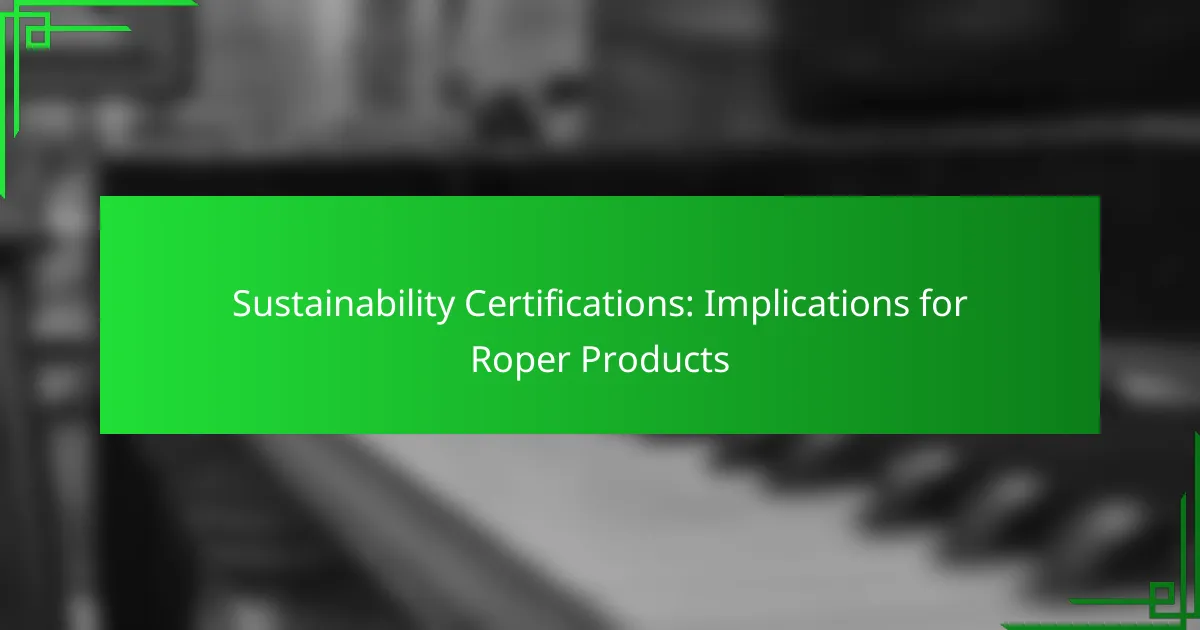Sustainability certifications play a crucial role in enhancing Roper Products’ market position by showcasing their commitment to environmental responsibility. By obtaining certifications such as ISO 14001, LEED, and Energy Star, Roper Products can improve brand loyalty, drive sales, and ensure compliance with evolving regulations while boosting their environmental credibility.
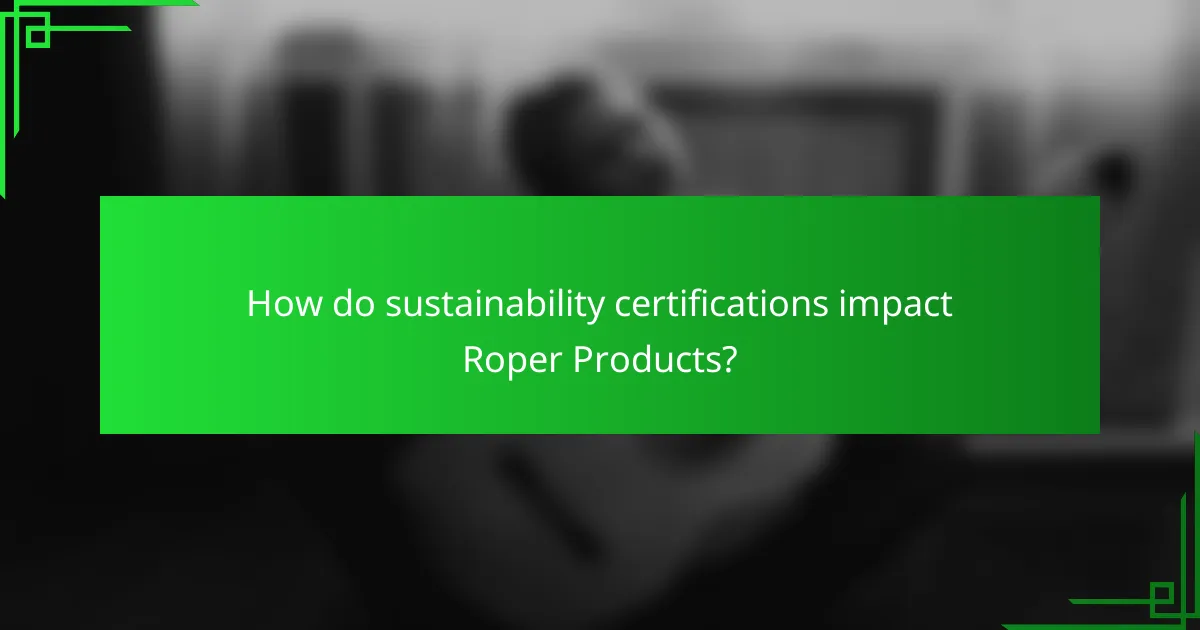
How do sustainability certifications impact Roper Products?
Sustainability certifications significantly enhance Roper Products’ market position by demonstrating commitment to environmental responsibility. These certifications can lead to increased sales, improved brand loyalty, and compliance with evolving regulations.
Enhanced marketability
Sustainability certifications can make Roper Products more appealing to consumers who prioritize eco-friendly options. By showcasing certifications such as Energy Star or LEED, Roper can differentiate its products in a competitive market.
Furthermore, certified products often qualify for green marketing initiatives, which can attract environmentally conscious buyers. This can lead to increased visibility and potentially higher sales volumes.
Improved customer trust
Having recognized sustainability certifications can significantly boost customer trust in Roper Products. Certifications serve as third-party validation of a company’s commitment to sustainable practices, reassuring consumers about their purchase decisions.
Trust is crucial in today’s market, where consumers are increasingly skeptical of corporate claims. By transparently displaying certifications, Roper can foster stronger relationships with its customers, enhancing brand loyalty.
Regulatory compliance
Sustainability certifications can help Roper Products meet local and international regulatory requirements. As governments worldwide tighten regulations on environmental impact, having certifications can ensure compliance and avoid potential penalties.
In some regions, certified products may also benefit from tax incentives or grants, making it financially advantageous for Roper to pursue these certifications. Staying ahead of regulatory changes can position Roper as a leader in sustainability within its industry.
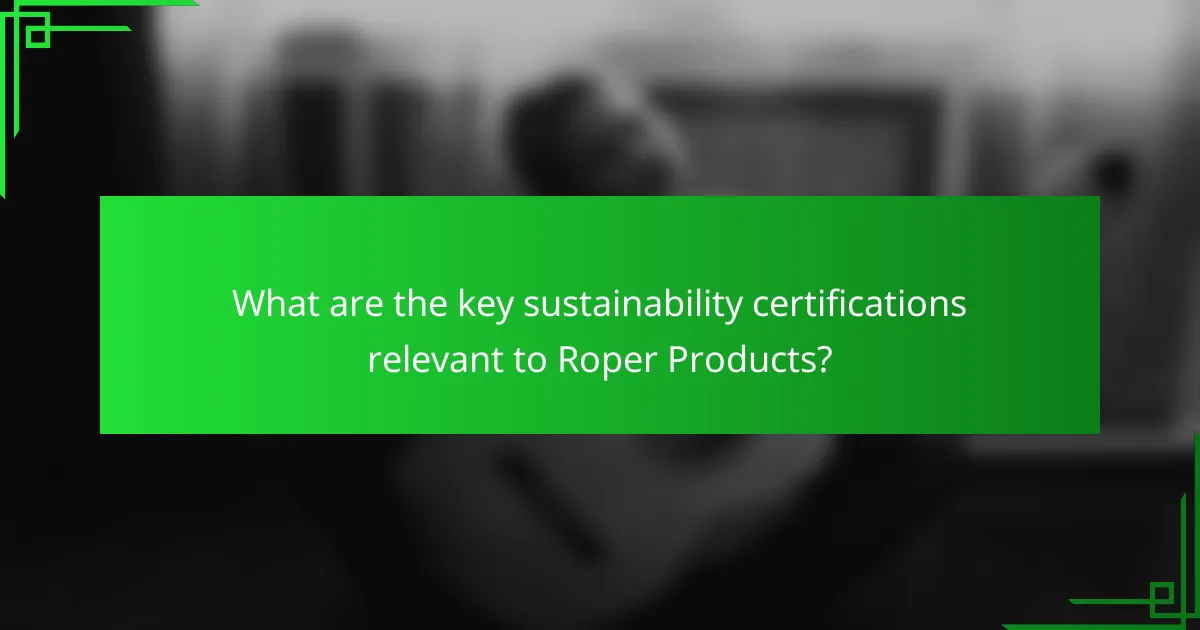
What are the key sustainability certifications relevant to Roper Products?
Roper Products can benefit from several key sustainability certifications that enhance their environmental credibility and market appeal. These certifications include ISO 14001, LEED Certification, and Energy Star, each focusing on different aspects of sustainability and operational efficiency.
ISO 14001
ISO 14001 is an international standard that outlines the requirements for an effective environmental management system (EMS). It helps organizations improve their environmental performance through more efficient use of resources and reduction of waste.
To achieve ISO 14001 certification, Roper Products must establish an EMS that includes setting environmental objectives, conducting regular audits, and ensuring compliance with relevant regulations. This certification can lead to cost savings and improved stakeholder trust.
LEED Certification
LEED (Leadership in Energy and Environmental Design) Certification is a globally recognized symbol of sustainability achievement in building design and construction. It focuses on energy efficiency, water conservation, and sustainable site development.
For Roper Products, pursuing LEED Certification can enhance the marketability of their facilities. To qualify, they must meet specific criteria across various categories, such as energy performance and indoor environmental quality, which may involve investments in green technologies and materials.
Energy Star
Energy Star is a U.S. government-backed program that helps businesses and individuals save money and protect the environment through energy efficiency. Products and buildings that earn the Energy Star label meet strict energy performance standards.
By obtaining Energy Star certification, Roper Products can demonstrate their commitment to energy efficiency, which can lead to reduced operational costs and improved product appeal. This certification requires ongoing monitoring and reporting of energy usage to maintain compliance and leverage potential tax incentives.
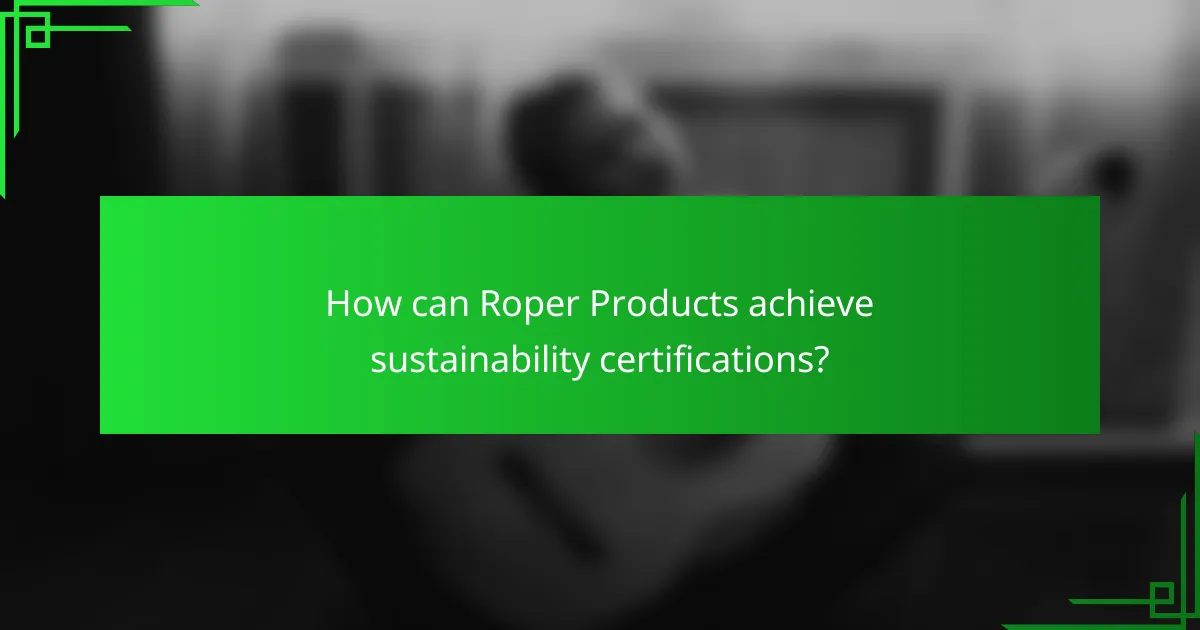
How can Roper Products achieve sustainability certifications?
Roper Products can achieve sustainability certifications by assessing their current practices, implementing sustainable methods, and following a thorough documentation and application process. This approach ensures compliance with recognized standards and enhances their marketability.
Assessment of current practices
The first step for Roper Products is to evaluate their existing operations to identify areas where sustainability can be improved. This includes analyzing energy consumption, waste management, and sourcing of materials. A sustainability audit can help pinpoint inefficiencies and opportunities for enhancement.
Benchmarking against industry standards or competitors can provide insights into best practices. Utilizing tools like the Global Reporting Initiative (GRI) or the Sustainability Accounting Standards Board (SASB) can facilitate this assessment.
Implementation of sustainable practices
Once current practices are assessed, Roper Products should implement sustainable practices across their operations. This may involve adopting energy-efficient technologies, reducing waste through recycling programs, and sourcing materials from sustainable suppliers.
Engaging employees in sustainability initiatives can foster a culture of environmental responsibility. Training programs and incentive schemes can motivate staff to contribute to sustainability goals actively.
Documentation and application process
To achieve sustainability certifications, Roper Products must meticulously document their practices and improvements. This includes maintaining records of energy usage, waste reduction efforts, and sourcing practices. Proper documentation is critical for transparency and accountability.
After gathering necessary documentation, Roper Products can apply for certifications such as ISO 14001 or LEED. Each certification has specific requirements, so it’s essential to follow the guidelines closely to ensure a successful application.
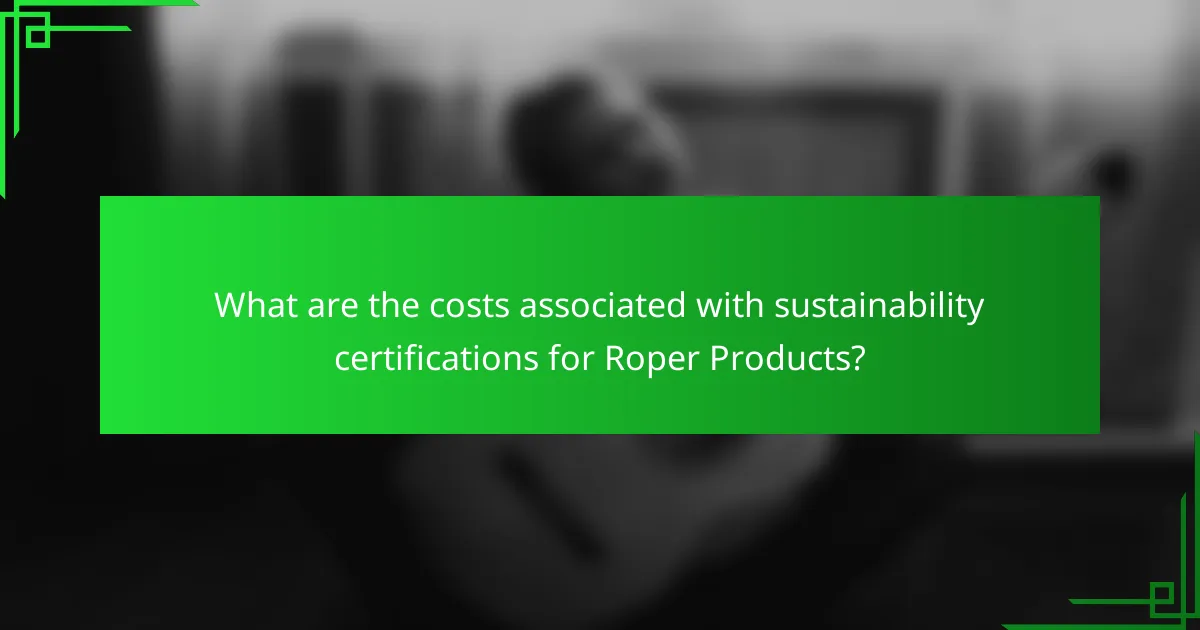
What are the costs associated with sustainability certifications for Roper Products?
The costs associated with sustainability certifications for Roper Products can vary significantly based on the type of certification sought and the specific requirements involved. Key expenses typically include certification fees, consulting costs, and training expenses, all of which contribute to the overall investment in achieving and maintaining certification.
Certification fees
Certification fees are the primary costs incurred when pursuing sustainability certifications. These fees can range from a few hundred to several thousand dollars, depending on the certifying body and the complexity of the certification process. For instance, well-known certifications like LEED or ISO 14001 may have higher fees due to their rigorous standards.
It’s essential to budget for these fees early in the planning process, as they can impact the overall financial feasibility of certification. Additionally, some organizations may offer discounts for non-profits or small businesses, which can help reduce costs.
Consulting costs
Consulting costs can significantly influence the total expense of obtaining sustainability certifications. Many companies opt to hire consultants to navigate the certification process, which can cost anywhere from a few thousand to tens of thousands of dollars, depending on the project’s scope and the consultant’s expertise.
When selecting a consultant, consider their experience with specific certifications relevant to Roper Products. Engaging a knowledgeable consultant can streamline the process and potentially save money in the long run by avoiding common pitfalls.
Training expenses
Training expenses are another important consideration when pursuing sustainability certifications. Roper Products may need to invest in training programs for employees to ensure they understand the requirements and practices necessary for compliance. Training costs can vary widely, ranging from online courses costing a few hundred dollars to extensive workshops that may reach several thousand dollars.
To optimize training expenses, consider utilizing in-house resources or online platforms that offer flexible learning options. This approach can help reduce costs while still equipping staff with the necessary knowledge to support certification efforts effectively.
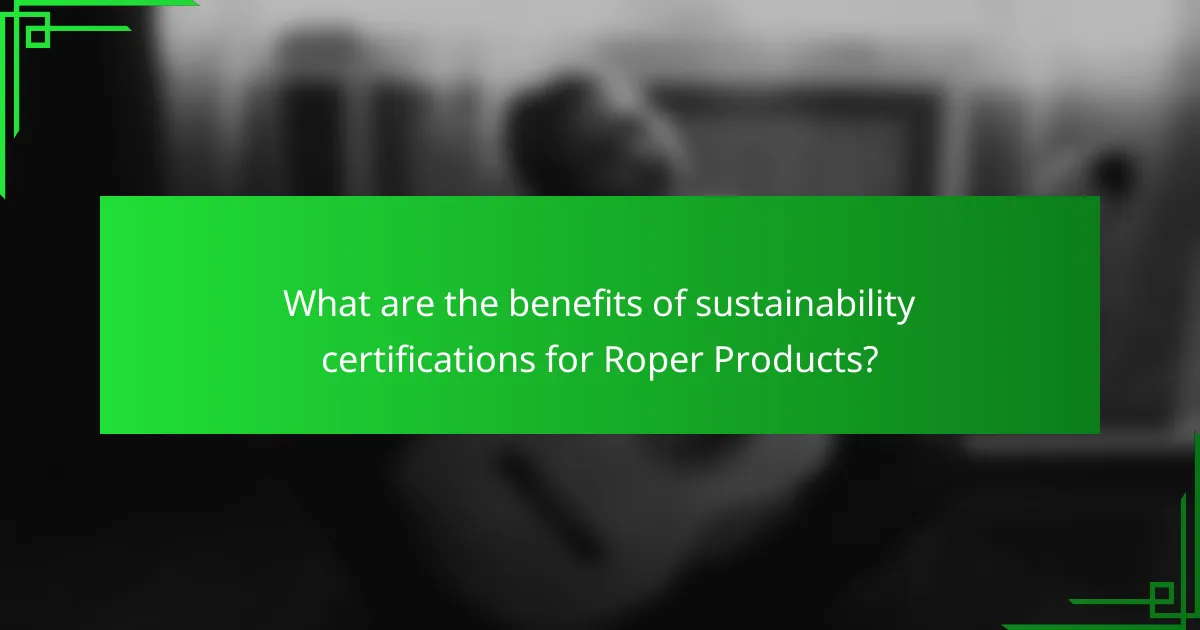
What are the benefits of sustainability certifications for Roper Products?
Sustainability certifications offer Roper Products significant advantages, including enhanced marketability and improved consumer trust. These certifications can lead to increased sales, access to new markets, and a stronger appeal to environmentally conscious customers.
Increased sales
Obtaining sustainability certifications can lead to increased sales for Roper Products by differentiating them from competitors. Customers are increasingly willing to pay a premium for products that are certified as environmentally friendly, which can result in higher profit margins.
For example, products with recognized certifications like Energy Star or USDA Organic often see sales boosts of 10-30% compared to non-certified alternatives. This trend reflects a growing consumer preference for sustainable options.
Access to new markets
Sustainability certifications can open doors to new markets that prioritize eco-friendly products. Many retailers and distributors now require certifications as a condition for stocking products, particularly in sectors like retail, food service, and construction.
By obtaining relevant certifications, Roper Products can tap into these markets, expanding their reach and potentially increasing their customer base significantly. For instance, entering European markets often necessitates compliance with strict environmental standards.
Attracting eco-conscious consumers
Eco-conscious consumers are actively seeking brands that align with their values, and sustainability certifications can help Roper Products attract this demographic. Certifications serve as a credible signal of a company’s commitment to environmental responsibility.
Marketing efforts that highlight these certifications can enhance brand loyalty and encourage repeat purchases. Engaging with eco-conscious consumers through targeted campaigns can further strengthen this connection, leading to long-term customer relationships.
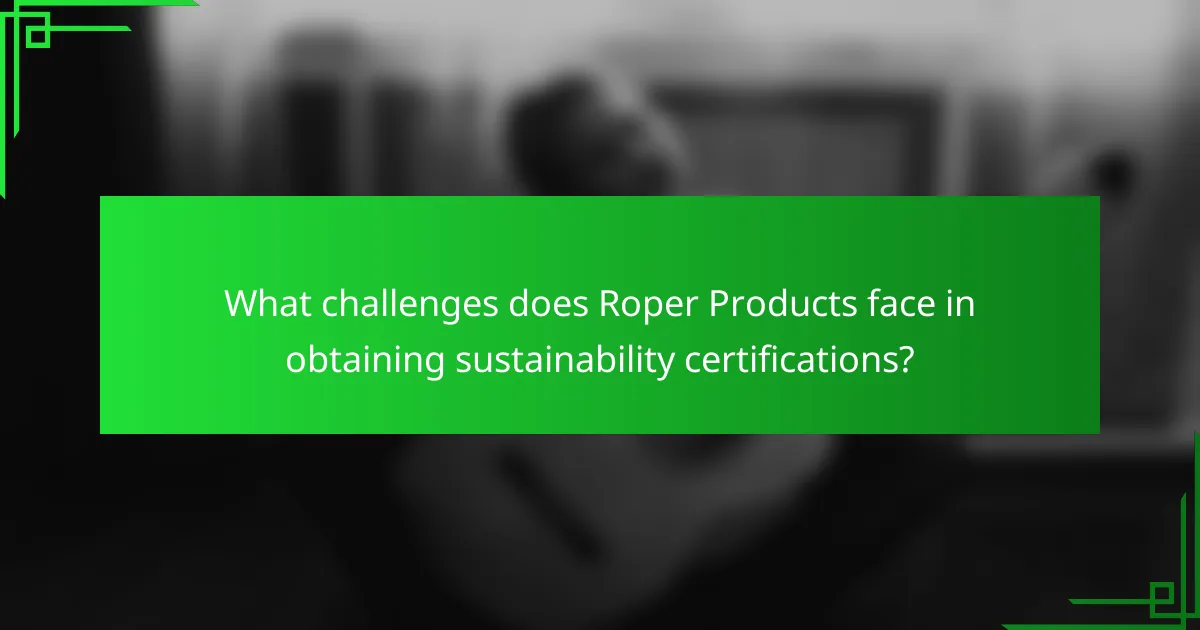
What challenges does Roper Products face in obtaining sustainability certifications?
Roper Products encounters several challenges in obtaining sustainability certifications, including compliance with complex standards, resource allocation, and market competition. These hurdles can hinder their ability to achieve recognized certifications that demonstrate environmental responsibility.
Complexity of Certification Standards
The variety of sustainability certification standards can be overwhelming for Roper Products. Each certification, such as ISO 14001 or LEED, has specific requirements that must be met, often involving detailed documentation and rigorous audits. Understanding these complexities is essential to avoid missteps that could delay certification.
Companies must also consider the differences between certifications. Some focus on energy efficiency, while others emphasize waste reduction or sustainable sourcing. Roper Products needs to align its operations with the appropriate standards that reflect its sustainability goals.
Resource Allocation and Costs
Obtaining sustainability certifications often requires significant investment in time and resources. Roper Products must allocate budget for training, process adjustments, and potential upgrades to facilities or equipment. This can strain financial resources, especially for smaller projects.
Additionally, the costs associated with certification can vary widely. Companies might face fees for application, audits, and ongoing compliance, which can add up quickly. Roper Products should weigh these costs against the potential benefits of enhanced marketability and customer trust.
Market Competition and Consumer Expectations
In a competitive market, Roper Products faces pressure to not only obtain certifications but also to maintain them. Competitors may already have established certifications, making it crucial for Roper to keep pace. Failure to do so could result in lost market share.
Consumer expectations are also evolving, with many buyers prioritizing sustainability in their purchasing decisions. Roper Products must ensure that its sustainability certifications are not only obtained but also effectively communicated to customers to enhance brand loyalty and attract environmentally conscious consumers.
